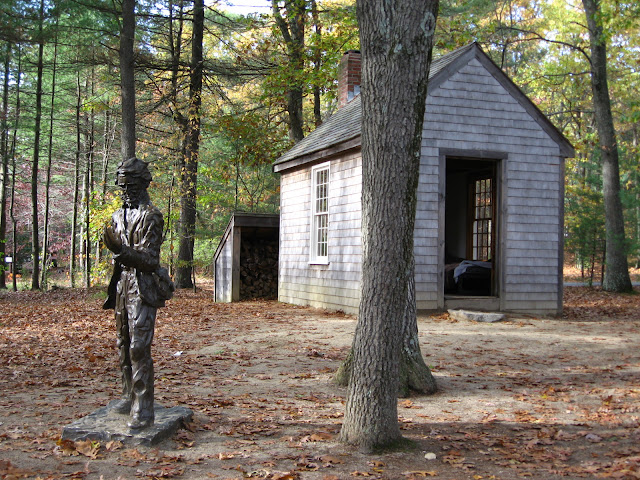“Walking” by Henry David Thoreau
 |
| Thoreau statue and replica cabin, Walden Pond, Concord, MA |
By Jim Baggett | Archives Department, Central Library
The Covid-19 shutdowns and quarantines have reminded us of something important about ourselves. We are not meant to sit still for too long. We spawned in the oceans and learned to run on the savannas. We are explorers and wanderers. And there is probably no American writer who understood this aspect of human nature better than Henry David Thoreau. In his 1851 essay “Walking,” Thoreau tells readers, “We should go forth on the shortest walk, perchance, in the spirit of undying adventure.”
Readers who have opinions about Thoreau tend to have strong opinions. Thoreau will make your mind soar or leave you cold. There’s seldom a place in between. This is especially true of young adult readers. Some who discover Thoreau in their youth, like this reviewer, are left amazed every time they pick up one of his works. Other young readers find Thoreau pompous, way too much over the top. He can be wordy and bombastic, reminiscent of the radio disc jockey Chris on the 1990s television series Northern Exposure. Some young readers point out his hypocrisy—while living on Walden Pond his mother still made his dinner and washed his clothes—and few things appall and excite the young as much as catching their elders in any form of hypocrisy.
 |
| Henry David Thoreau, 1861 |
Thoreau does nothing halfway. “If you are ready to leave father and mother, and brother and sister, and wife and child and friends, and never see them again; if you have paid your debts, and made your will, and settled all your affairs, and are free . . . then you are ready for a walk.”
Some readers make the mistake of taking Thoreau too literally. In “Walking” he is not saying that we should actually abandon our families, quit our jobs, cancel Netflix, and go live in the forest. Thoreau, who keeps becoming relevant over and over again, is talking about what we now call “mindfulness.” Living in the moment, and embracing the world. He is reminding us that the wilderness was our first home, and we need to keep some bits and pieces of that ancient experience alive within us.
Thoreau calls this our “wildness.” “Life consists with wildness,” he writes. “The most alive is the wildest.”
Wildness is what moves us forward as a species. It takes us to places that matter. Wildness is about being simultaneously deep within ourselves and completely outside ourselves. Wildness is remembering our place in nature and seeing that we are all part of a glorious whole. It is about understanding that we are both great and small. And that we must walk, physically and metaphorically because, as Thoreau reminds us, “Half the walk is but retracing our steps.”
That is wildness. That is Thoreau. And that is why we are all itching to go outside (while practicing responsible social distancing, of course).
Comments